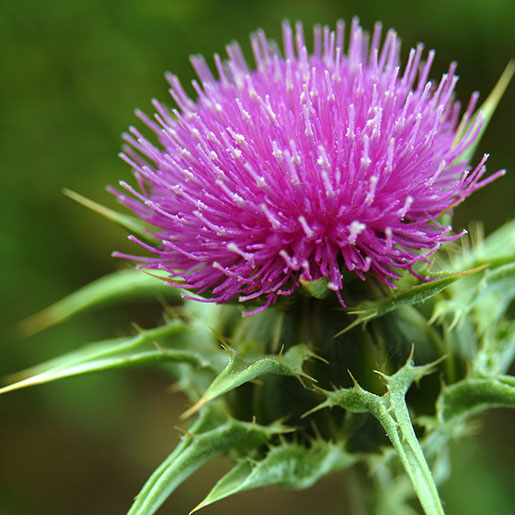Study of Milk Thistle’s Effects Highlights a Two-Phase Process

Results from a new analysis of the milk thistle extract silymarin suggest that the compound protects cells via processes that suppress cellular metabolism, activate stress pathways, and downregulate inflammatory signaling. Researchers at the University of Washington published the study, which was supported in part by NCCIH, in the Journal of Natural Products.
Silymarin is the dietary supplement most commonly used by people with hepatitis C, a viral liver disease. Although preliminary laboratory studies found that silymarin exerted antiviral, anti-inflammatory, antioxidant, and liver-protective effects, researchers still don’t fully understand why, and those benefits were not seen in clinical trials (studies in people) of milk thistle for liver diseases.
The new study had several major components:
- Profiling transcriptional changes in gene expression—including through microarray analysis, which allows the expression of many genes to be studied simultaneously
- Profiling metabolomics, i.e., studying small molecules in cells and biological systems that are involved in life-sustaining chemical reactions
- Examining signaling, a process that helps produce biological responses to internal or external events.
A major finding from the study was a two-phase response of cells to silymarin. The first phase is a rapid increase in expression of genes associated with cellular stress, followed by a longer-term, more sustained suppression of gene expression associated with inflammation. The researchers performed the work in both human liver- and T-cell lines.
In more detail, silymarin in the study:
- Induced endoplasmic reticulum stress
- Triggered activating transcription factor 4 (ATF-4) and AMP-activated protein kinase (AMPK), and inhibited mammalian target of rapamycin (mTOR)
- Modulated the actions of many types of metabolites
- Inhibited inflammatory signaling pathways, when given on a prolonged basis (at 24 hours, in this study).
Silymarin has company among natural products in this kind of two-phased process, the authors note, giving curcumin and EGCG (epigallocatechin gallate, a component of green tea) as examples. How these products alter cell metabolism and kick off stress signaling to promote cell repair and survival more than cell death, and how such pathways relate to inflammatory signaling, are areas recommended for future research. Using natural products as tools to define how cellular stress links to inflammatory status may reveal opportunities for selective reprogramming of cellular metabolism to alter immune and inflammatory responses in health and disease.
Reference
- Lovelace ES, Wagoner J, MacDonald J, et al. Silymarin suppresses cellular inflammation by inducing reparative stress signaling. Journal of Natural Products. 2015;78(8):1990-2000.
Additional Resources
Publication Date: July 17, 2015